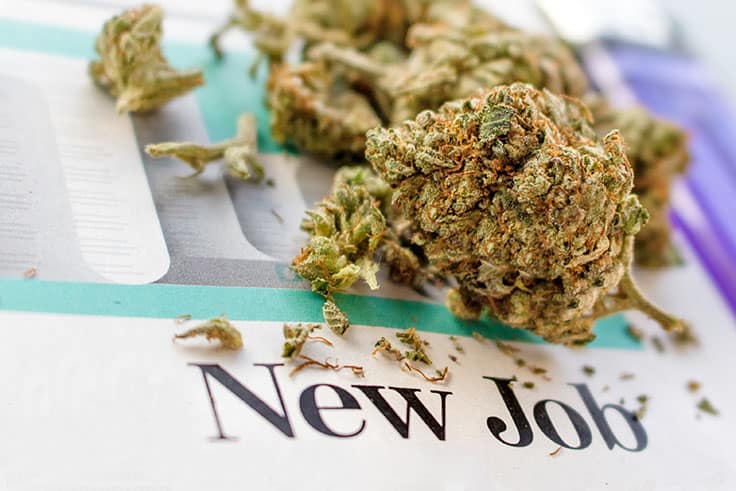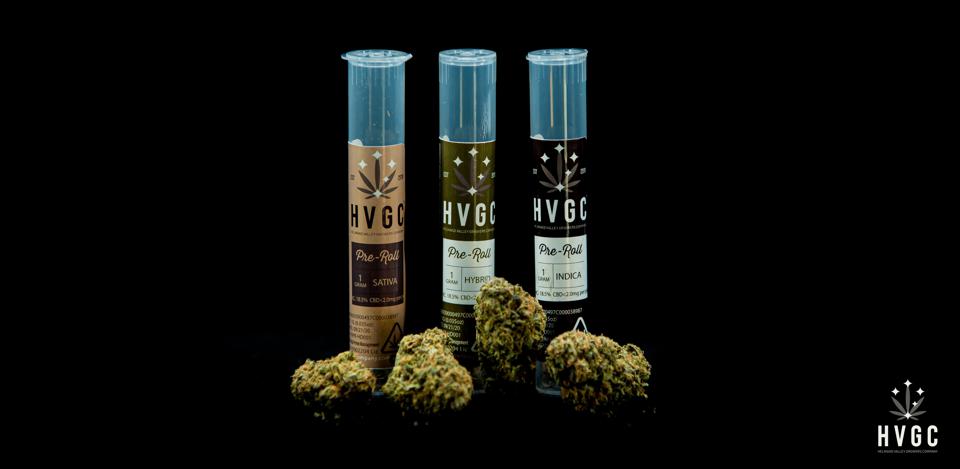When she worked in the fields of natural products and dietary supplements, policy attorney Amber Littlejohn started doing some work in the hemp and CBD space. And not only for that reason, the career change to serve as senior policy adviser for the Minority Cannabis Business Association (MCBA) in some ways placed her in a comparable atmosphere.
The cannabis and hemp markets are similar to the natural products and dietary supplement industries, Littlejohn said, because all of them are “heavily regulated,” “emerging” and “embattled.”

Photo courtesy of Amber Littlejohn
“Another really significant overlap [is that] while there are big players, innovation and culture around the products are really driven by small companies,” she said. “And I wanted to make sure that as we’re growing the cannabis industry that there are adequate opportunities for small and especially small minority businesses.”
Littlejohn has now been with MCBA for almost two years, first working on its federal policy program as senior policy adviser, then taking the helm as executive director this past November.
“Our leadership has done an extraordinary job of creating policies and building the reputation of the organization,” Littlejohn said of MCBA’s work. “And so, now, we really want to leverage that to be a strong resource for our community, both in providing the resources that people need to enter and succeed in the industry, as well as driving policy around the country.”
In an interview with Cannabis Business Times, Cannabis Dispensary and Hemp Grower, Littlejohn expands on the importance of strengthening small businesses and businesses owned by people of color—and how it can be done.
This interview has been edited for length and clarity.
Patrick Williams: What are you currently most excited about that’s going on at MCBA?
Amber Littlejohn: I am most excited about our growing ability to engage a broader cross-section of our membership and community. We are seeing new opportunities through committees and advisory boards to be able to really leverage the voices and have the voices of both operators and community members become a more meaningful part of the discussion. So often around the country, the voices of minority operators are absent in the discussion. And so, we want to make sure that that’s heard. The large corporate interests—the multi-state operators—do a great job of advocating for their interests. The criminal justice and social justice activists have been doing this for quite some time and are great at advocating for the needs of the community in that regard. But we really want to make sure that economic justice is part of the discussion and that as we are … building any sort of a functioning legal cannabis framework that equity is a cornerstone of that and that equity is inclusive of policies that create and sustain opportunities for small, minority-owned businesses.
PW: Could you talk about how the challenges and opportunities surrounding representation and social equity compare when you’re looking at both the state-legal market and the hemp market?
AL: Some of the ways that they’re similar is that there is a gigantic opportunity and resource gap between small minority businesses and some of the larger operators. When you are entering a heavily regulated, capital-intensive industry, there is a gigantic learning curve in terms of making the connections you need to within the supply chain, the technical compliance issues, and even just some of the foundational business knowledge that in the communities that have been most impacted by prohibition are not always there or accessible. And I would say that carries through to the hemp industry as well. I would say the one major difference there is that while access to capital is an issue in the hemp industry, it is an extraordinary issue when it comes to the cannabis industry and to federal prohibition on lending to cannabis businesses.
PW: In states where cannabis is fully legal and state-legal programs are set up, could you talk about what social equity programs are doing right and what they’re doing wrong?
AL: One thing that’s happening the right way is that around the country, we are definitely seeing that there is a commitment to equity being a part of any legal framework. And that’s promising, and that’s heartening. I feel one of the biggest challenges, though, is ensuring that the language that’s included and the provisions that are put forth are truly actionable and meaningful. Social equity language can sound good, but if there isn’t funding, if there are extraordinary regulatory hurdles baked into either the qualification or the framework itself, that can yield results that are inequitable. Again, another issue is going to be access to capital, access to properties and real estate, zoning laws—all of these things are hurdles that need to be addressed as we’re going through these frameworks if we want the end result to be equitable and not just the language in the law.
PW: Why don’t we see more social equity programs in medical-only states?
AL: So, that’s interestingly enough something that we’re looking at in the state of Virginia, and looking at the possibility of expanding the medical program there with a focus on social equity and small business. [Why] I don’t think we see more of that is that—again, this is baked into the regulations of many medical programs: a requirement to create hurdles that are insurmountable for all small businesses, especially minority-owned small businesses.
So, we want to make sure that when we’re looking at medical programs—either new medical programs [or existing ones]—that they are ensuring that there are opportunities created within that framework that are accessible and sustainable. A good example is extraordinarily high canopy minimums that require tens of thousands of dollars in startup capital. … Also, most states have … medical programs [that] have limitations … [on] who can operate that exclude some of the individuals that have been most impacted by prohibition.
I really do think it’s important that as we are going through the legalization process, that in addition to expanding the medical program—or expanding medical programs throughout the country with an eye towards equity and small business—that we’re also reevaluating existing medical programs to provide opportunity, because what we’re seeing is a push toward co-location of adult-use licenses with medical operators. And this can have—depending on the market, this could have a very [big] impact from completely consuming the market and leaving little for anyone else, as we see in Arizona, to potentially providing the opportunity for medical operators to incubate or support small minority businesses. So, again, it’s something that absolutely has to be revisited because we don’t want to see non-diverse medical operators control any market.
PW: Did Americans’ increased outspokenness about systemic and racism and police brutality last year shift the focus of the cannabis and hemp industries at all—or highlight how focuses should be shifted—to better suit the needs of people of color?
AL: Yeah, absolutely. We had started to see a shift before that in some circles. But as of last year, we really have seen a recommitment and a recognition that this can’t move forward without equity being a strong element of the program. Last year, MCBA worked with the U.S. Hemp Roundtable to create the Minority Empowerment Committee there, which was an extraordinary step for the hemp industry, in both recognizing its own history as an industry and the need to move forward with a greater focus on diversity. So, we’ve done, again, some great work, both in bringing some new … programming and even shifting the policy priorities of the hemp industry to focus on issues like the drug felony exclusion that’s in the 2018 Farm Bill.
PW: Also last year, you joined the board of the U.S. Hemp Authority. Are you working with them on issues of representation as well?
AL: The U.S. Hemp Authority focuses primarily on standards-setting for the industry. Regulatory compliance and having the ability to have guidance and support in creating safe and effective products is something that is necessary for all businesses. But when it comes to the ability to navigate a crowded market, we want to make sure that we are making accessible to smaller businesses the advantage of third-party certification, [for them] to be able to stand out in that industry, so definitely wanting to reach a broader audience to provide greater understanding on the labyrinth of compliance. We had some individuals from the Hemp Authority participate in some educational events and really helping to better inform the community on [the] … framework that we have for hemp.
PW: What types of policy and funding do you feel need to be built into a federal cannabis legalization bill so that legalization helps repair the harms of prohibition?
AL: We need to … incentivize [government] to create frameworks that are supportive and inclusive of the communities that have been most impacted by the war on drugs. We also want to see a significant amount of the revenues directed back into the communities in ways that are beyond just the industry, but working at restoring some of these generational [funds that address] … prohibition and the incarceration that surrounded prohibition. It’s also really necessary to take a look at the framework itself that’s created because again, if you’re excluding from the industry individuals that have been most impacted, that is an unacceptable result. We need to make sure that we are able to [assign] appropriate regulatory burdens to small businesses so that, again, small businesses and small minority-owned businesses are just not buried in costly and unnecessary regulations.
PW: We have heard that nonprofits have been compelled to pay taxes in the cannabis industry. How can that be remedied?
AL: So, in 2018, [the government] passed a rule that any organizations that advocate for the cannabis industry are not able to receive a determination letter from the IRS, which means that we can’t get federal nonprofit status. There are some organizations that were grandfathered in, but at that time, MCBA was not officially recognized as a federal nonprofit. So, this means that older, established organizations that had previously completed the [registration] process can advocate, and organizations that advocate against the cannabis industry can receive federal nonprofit status. But organizations like MCBA or any of the newer, emerging social equity organizations, cannot get those same protections. So, it leaves us, firstly, paying taxes on what we raise. And then additionally, it limits contributions from organizations that are looking for opportunities to get to actually federally [recognized] nonprofit [status]. So, it does limit the growth of organizations like ours. We are of the mind that it is pretty clearly unconstitutional, given the fact that it only keeps from nonprofit status organizations that are advocating for, not organizations that are advocating against, [cannabis].
PW: What can the cannabis industry do to honor Black history and the history of people of color throughout the entire year and recognize how Black history has led to where we are today? (This interview was conducted in February, Black History Month.)
AL: It’s important to realize that equity is woven throughout everything that we do. Equity is not just D&I [diversity and inclusion]. It is not just a statement that you’re making on social media. And it’s not just narrow, one-off initiatives. It is woven through your practices from seed to sale and beyond. It is your supply chain. It is how you are reinvesting money. It’s about policy. And it’s important that when, especially the larger companies are moving throughout markets and communities that they’re understanding how the policies that they are supporting are going to impact communities. And so, if you’re looking at [supporting] monopolies, that is not promoting equity.
If you are supporting a system or a framework that doesn’t have meaningful opportunities for communities of color, you are not actually supporting and creating equity. If there is not community reinvestment, if you are not focused on ensuring that alongside legalization comes the restoration of communities, that’s not true equity. So, equity needs to be a part of all decision-making, from, again, your events and DEI [diversity, equity and inclusion] policy to your regulatory policy. And so, it’s important that industry is looking for Black voices and voices of color, and representation, throughout the company, and not just in departments that are handling either community outreach or DEI.





